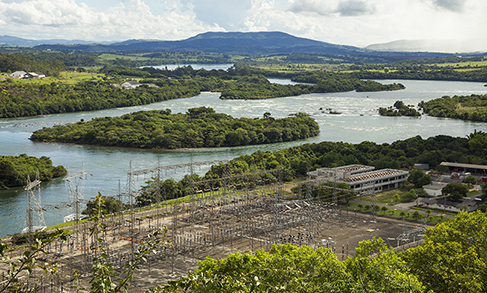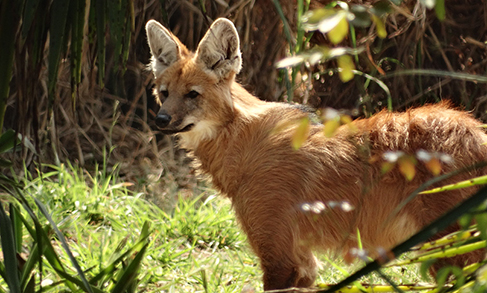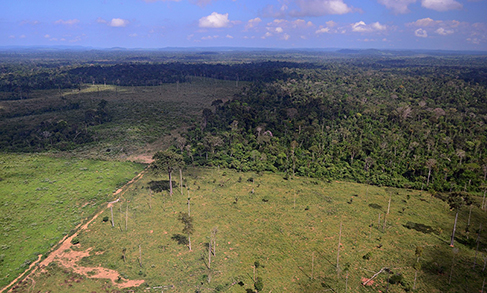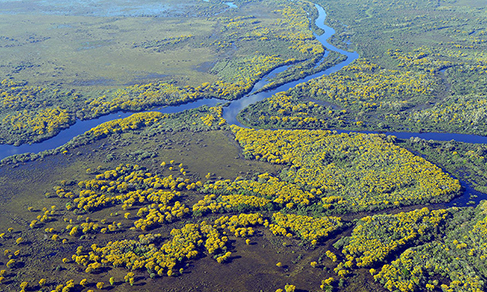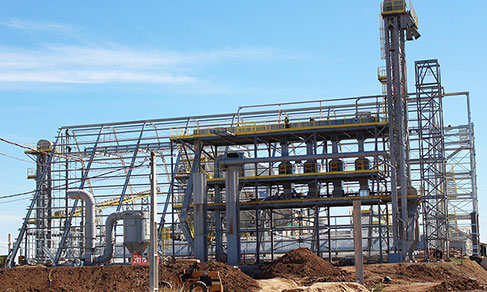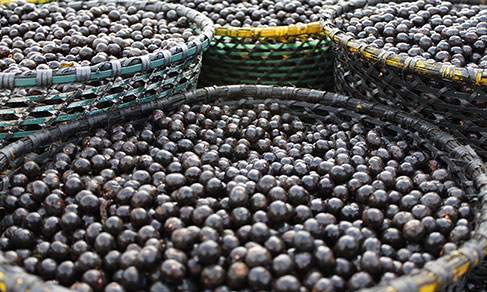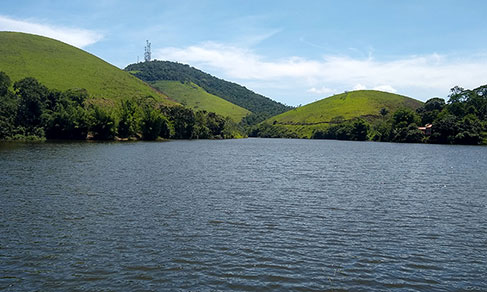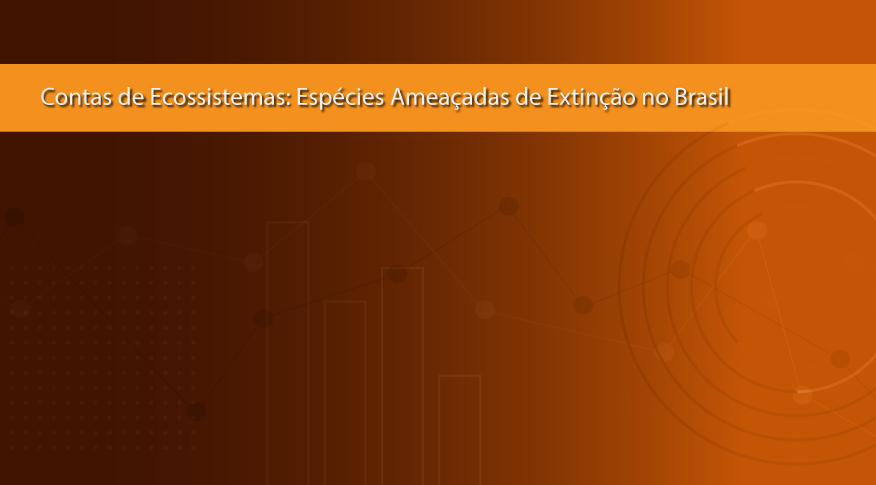Nossos serviços estão apresentando instabilidade no momento. Algumas informações podem não estar disponíveis.
Environmental-Economic Accounting
Description
The Environmental-Economic Accounting is a system of measurement and analysis, represented by a set of tables, which describes the interaction between the environment and the economy in order to give support to planning and decision making for public and business policies.
The methodology of economic and environmental accounting has been established by the United Nations through the System of Environmental-Economic Accounting - SEEA, in order to integrating economic, environmental and social data into a single statistical structure, considering also the characteristics of the country with regard to environmental, social and economic particularities and the availability of data. SEEA has eight thematic areas, including specific natural resources, such as water and energy, in addition to Ecosystem Accounting, among others. The proposed methodology for specific resource accounts is based on a central framework that accounts for the natural resources involved in the production of goods and services, establishing a relationship between the natural resources used and the income generated by different economic activities. In Brazil, the series of information on Environmental-Economic Accounting - CEA, results from a partnership between the IBGE and the National Water Agency - ANA. It began with the disclosure of results on the Environmental-Economic Accounting for Water - CEAA, covering the period from 2013 to 2015, based on the methodological recommendations in a specific manual for water: System of Environmental-Economic Accounting for Water, SEEA-Water. Ecosystem accounting, in turn, is based on the methodological recommendations contained in a specific manual: System of Environmental-Economic Accounting 2012: Experimental Ecosystem Accounting, SEEA-EEA, given the need to cross georeferenced spatial data. This methodology is being consolidated and tested by the United Nations, and the study is still called Experimental Ecosystem Accounting. The IBGE started the methodological tests for ecosystem accounting in 2017, from its participation in the Natural Capital Accounting and Valuation of Ecosystem Services (Ncaves) project - a United Nations global project, financed by the European Union which includes five countries (South Africa, Brazil, China, India and Mexico). The first results of the Ecosystem Accounting include Land Use in Brazilian Biomes, covering the period from 2000 to 2018, and the Endangered Species in Brazil, whose reference is 2014.
Currently, the accounts for water, energy, forests (wood and non-wood resources), biodiversity, ecosystem extent (ET) and ecosystem condition (EC) are being developed, tested and planned by the IBGE in partnership with specialized institutions. The geographic scope of these studies is national, with results published for different territorial sets.
About the publication - 2013-2015
Since water is a key component of economic development, it is necessary to adopt policies that integrate sectoral planning with the management of water resources; therefore, it is essential to join economic, social and hydrological information to the sustainable management of natural resources. In order to combine such information, the United Nations Statistics Division (UNSD) has formulated the manual System of environmental-economic accounting for water, SEEA-Water, with guidelines for a systematic and periodic assessment of key indicators involving the integration of physical and monetary data on water.
With the publication of the present fact sheet, the IBGE, together with the Ministry of the Environment and the National Water Agency - ANA and with the support of the Deutsche Gesellschaft für Internationale Zusammenarbeit - GIZ GmbH, puts out the first results of the Environmental-Economic Accountings for Water - CEAA, relative to the 2013-2015 period. These accounts provide physical and monetary indicators on water supply and demand in Brazil, by economic activities and by households, and as they are an initial data set subject to improvements and expansions, its results are preliminary.
The information disclosed herein shows the participation of economic activities and households in the flows of water withdrawals and returns to the environment, and the conditions, in terms of costs for users, of the use of water resources. Data are organized into three groups: Stock Tables, Physical Supply and Use Tables - Physical SUT, and Hybrid Supply and Use Tables - Hybrid SUT. The Stock Tables show the increments and abstractions in the stock of water resources; the Physical Supply and Use Tables - Physical SUT report withdrawals by abstraction of the environment for the economy, water flows within the economy and the return of the economy to the environment; and the Hybrid Supply and Use Tables - Hybrid SUT relate, finally, the monetary amounts of production, consumption and costs associated with the Water and Sewage activity. The breakdown by economic activities is based on the National Classification of Economic Activities - CNAE 2.0 and the methodological recommendations of SEEA-Water.
The CEAA fact sheets are aso released in printed format. The technical notes on the implementation of the accounts are released apart and can be accessed only in digital media, on this page. They include methodological considerations on the subject, inform aspects of the dissemination of the results and present a glossary with the terms and concepts considered relevant.
Tables - 2013-2015
Stock Tables - 2013-2015 (in xls and ods)
Physical Supply and Use Tables - 2013-2015 (in xls and ods)
Hybrid Supply and Use Tables - 2013-2015 (in xls and ods)
Stock Indicators - Physical and Hybrid - 2013-2015 (in xls and ods)
Publications - 2013-2015
Contas econômicas ambientais da água : Brasil : 2013 - 2015
Material type: Book
Year: 2018
Learn more - 2013-2015
News and Releases
Environmental-Economic Accounting for Water: Brazil
In 2020, Brazil consumes 6.2 liters of water for each R$1 generated by the Economy
In 2020, 6.2 liters of water were consumed for each real of gross value added (GVA) generated by the...
02/06/2023
Ecosystem Accounting
IBGE updates statistics on threatened species in Brazilian biomes
The IBGE released today (24) the updated data on threatened species for year 2022. This set of information...
24/05/2023
Ecosystem AccountingEnvironmental-Economic Accounting for Land
Between 2000 and 2020, agricultural area grew 230 thousand km², natural vegetation reduced 513 thousand km² in Brazil
The IBGE released today (7) the Environmental-Economic Accounting for Land: Physical Accountability,...
07/10/2022
Ecosystem Accounting
In partnership with the UN, IBGE releases integrated analysis of Ecosystem Accounts
The IBGE releases today (20) “Ecosystem Accounts: results of the NCAVES project in Brazil ”, which compiles...
20/05/2022
Environmental-Economic Accounts for Energy: products from biomass
In 2018, Brazil generated R$84 billion in energy products from biomass
In 2018, the national production of natural energy inputs from biomass was 91.3 million tonnes of oil...
09/12/2021
Environmental-Economic Accounts for Energy: products from biomass
Biomass products represented 9% of electricity in Brazil in 2018
In 2018, the production of electricity from energy products from biomass was of 54.4 thousand gigawatt-hour...
09/12/2021
Ecosystem Accounting
Experimental study estimates value of water bodies during abstraction, treatment and distribution of water
The IBGE has released today (28) Ecosystem Accounting: Value of the Ecosystem Service of Blue Water Provisioning...
28/04/2021
Ecosystem Accounting
Experimental study analyzes amount and value of non-wood forest products per biome
The IBGE has released today (15) the Ecosystem Accounts: Non-Wood Forest Products, experimental statistics...
15/04/2021
Environmental-Economic Accounting for Water: Brazil
Experimental study evaluates water conditions in Brazilian biomes
The IBGE has released today (15) Ecosystem Accounting: Condition of Water Bodies, experimental statistics...
15/04/2021
Ecosystem Accounting
In 2014, Atlantic Forest/Mata Atlântica was the biome with the highest number of species threatened with extinction
The survey “Ecosystem Accounting: Species Threatened with Extinction in Brazil”, which the IBGE releases...
05/11/2020
Errata
Correction in the publication “Ecosystem Accounting: Valuation of the ecosystem service of blue water provision 2013-2017”
Published date: 04/05/2021
Description:
Two typing errors were identified on page 26, in the title for Graph 7 and in the first paragraph, in the unit of measurement adopted in both of the cases.Actions: The file has been replaced.
Amendment in “Ecosystem accounts: land use in Brazilian biomes 2000-2018” publication
Published date: 16/10/2020
Description:
An error was pinpointed by the IBGE in the percentage data of the main conversion of land use in the Pantanal Biome. Due to a typing error, the percentage reported in the publication does not involve that in the survey´s databases.Actions: The text in the publication was changed to report the correct percentage.
Error in the release date of the publication "Ecosystem Accounting: Species Threatened with Extinction in Brazil 2014"
Published date: 02/10/2020
Description:
The IBGE identified an error for the non-compliance with the release date of the publication Ecosystem Accounts: Species Threatened with Extinction in Brazil 2014, expected to be released in October according to the calendar of geoscientific products available on the portal. Due to the COVID-19 pandemic, the release was postponed until November 05, 2020.Actions: The release calendar was changed.
Error in the release date of the publication "Ecosystem Accounting: Biodiversity and Species Threatened with Extinction, version 2014"
Published date: 28/09/2020
Description:
Error, identified by the IBGE, of non-compliance with the release date of the publication Ecosystem Accounting: Biodiversity and Biodiversity and Species Threatened with Extinction, version 2014, scheduled for September in the geoscientific products calendar on the IBGE web site. Due to the COVID-19 pandemic, its disclosure was postponed until October 16, 2020.Actions: The release date was rescheduled.
Links
Our websites:
SIDRA | Statistical Tables Database
Methodological manuals:
Manual of the System of Environmental-Economic Accoutning- Central Framework (UN)
Manual of the System of Environmental-Economic Accounting - Experimental Ecosystem Accounting (UN)
Other publications:
Ecosystems Accounts: Results of NCAVES Project in Brazil
Water Use in Rainfed Agriculture
International classification of ecosystems in Brazil
Other links:
Natural Capital Accounting and Valuation of Ecosystem Services (UN)




